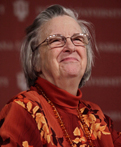Nobel Prize winner Elinor Ostrom delivers keynote at conference on cultural commons
 Elinor Ostrom, a Nobel laureate in economics who is a Distinguished Professor and Arthur F. Bentley Professor of Political Science at Indiana University Bloomington, delivered the keynote address on the first day of the Engelberg Center on Innovation Law and Policy’s September 23-24 conference, Convening Cultural Commons.
Elinor Ostrom, a Nobel laureate in economics who is a Distinguished Professor and Arthur F. Bentley Professor of Political Science at Indiana University Bloomington, delivered the keynote address on the first day of the Engelberg Center on Innovation Law and Policy’s September 23-24 conference, Convening Cultural Commons.
Ostrom is a leading scholar on the subject of common-pool resources, which include depletable shared systems such as water sources, fishing grounds, pastures, and the atmosphere. She has found that neither private property nor government intervention is necessarily the best approach to managing common-pool physical resources. As Professor Katherine Strandburg, co-director of the Engelberg Center, explained in introducing Ostrom, the conference was a chance to apply Ostrom's finding to cultural common resources such as ideas, inventions, and creative works.
At the beginning of her lecture, “The Role of Culture in Solving Social Dilemmas,” Ostrom cited Garrett Hardin’s seminal 1968 article “The Tragedy of the Commons,” which argued that a population sharing a common resource will deplete it because each individual is self-interested, unless the resource is privatized or its use controlled by the government. Not so, Ostrom said, asserting that her years of research showed how all arrangements—whether government-controlled, privatized, or owned by a community—work in some places but not in others. The success or failure of a specific approach to managing common resources, she said, hinged on the match of the specific institutional arrangement, local culture, and particular problems involved, as well as how the approach was implemented.
Ostrom spoke at length about field research in Nepal to examine shared irrigation systems. The findings, she said, challenged Hardin’s conventional theory of the commons: more “primitive” systems built and managed by locals often worked just as well as or better than the more modern systems installed by international development agencies. She then addressed the slippery question of how communities develop effective rules for governing their commons, and the benefits and limitations of different systems.
Ultimately, she said, policies for common resources should be thought of as experiments within complex systems. “We’ve tried to get everything as simple as we can when we analyze it, and the world ain’t like that. Trying to find the best set of rules for one kind of community as opposed to another...there isn’t one best set. What we have to realize is that all policy experiments may fail, and we need to move beyond some simple panacea.”
The two-day conference included six separate panels touching on topics such as medical care, scientific research and technology transfer, and commons theory and methodology. Participants included Strandburg, also a co-organizer of the conference; Professor Barton Beebe; Vicki Been '83, Boxer Family Professor of Law; Rochelle Dreyfuss, Pauline Newman Professor of Law and co-director of the Engelberg Center; Professor Katrina Wyman; Diane Zimmerman, Samuel Tilden Professor of Law Emerita; Adjunct Professor Jane Anderson; Michael Burstein '04, an assistant professor at Benjamin N. Cardozo School of Law; Margaret Chon, Donald and Lynda Horowitz Professor for the Pursuit of Justice and a current Senior Global Emile Noël Research Fellow at NYU Law's Jean Monnet Center for International and Regional Economic Law & Justice; and Tim Dornis, a professor of law at the Leuphana University of Lueneburg in Germany and a current Global Fellow from Practice & Government at NYU Law.
Watch the full video of the event (1 hr, 23 min):

